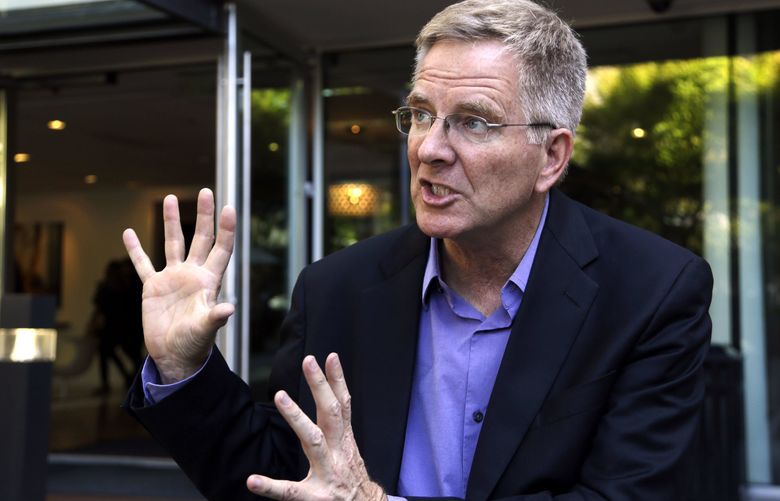
Rick Steves is in a bit of a conundrum. One that not even a million bucks is likely to solve.
“In the travel business, we are contributing to the destruction of our environment,” the Europe tour king, from Edmonds, acknowledged last month.
That is an understatement. In terms of carbon emissions that lead to global warming, there’s probably nothing worse we can do on an individual basis than take an intercontinental flight. A single round-trip flight between Seattle and, say, Rome, emits about 3.5 tons of CO2 per person — the same as nine months of driving in the average U.S. car, according to the EPA.
The carbon cost of flying is so steep that in Europe it’s led to a new movement that the Swedes call “flygskam.” It translates as “flight shame.” The premise is: fly less, or even, don’t fly at all.
The idea has taken off enough in Europe that flygskam was the talk of an airline conference last week. Headline: “Airlines scramble to overcome polluter stigma as ‘flight shame’ movement grows.”
Sounds like trouble if you’re in the travel business.
“There’s no need to stop traveling,” Steves implored his 600,000 followers on Facebook. “It’s not all or nothing. We are mitigating our contribution to the problem and still traveling.”
Steves announced he’s donating $1 million per year to nonprofit groups that help people worldwide affected by drought and famine, such as Bread for the World.
He picked the $1 million figure because it’s roughly what it would cost to buy carbon offsets for the 30,000 annual trips his company now leads to Europe. Carbon offsetting estimates the cost of pollution and seeks to compensate for it by investing in climate projects.
“Now, Rick Steves travelers have the peace of mind that they’re supporting a carbon-neutral tour company,” he said.
Well, not exactly, critics immediately pointed out.
“A travel company will never be carbon neutral, you simply cannot pay your way out of a carbon footprint,” said a solar energy consultant on Steves’ Facebook page.
“He’s giving money to organizations that help poor people deal with the fallout of wealthy people’s inability to give up anything,” went another, harsher, take.
I asked the director of the University of Washington’s Center for Environmental Politics, Aseem Prakash, what he thinks of all this. Prakash made waves at the university recently for calling out “the climate change hypocrisy of jet-setting academics,” while also petitioning the UW to trim its travel.
He said Steves’ critics are both right and wrong (nothing’s ever simple with global warming). They’re right, in that flying less is the only way to substantially reduce travel-related emissions. But Steves is right that paying a financial price for the emissions is much better than doing nothing.
“He’s effectively levying a carbon tax on himself,” Prakash said. “Economics says that he’s now paying closer to the true external costs of his activities — he’s paying for the pollution. Because of that, he may have to start charging more, and then people will travel less, at least with Rick Steves.”
Steves sees a different possibility — which is that soothing his customers’ flygskam may well prompt more business.
“If everyone only traveled with us because of this, every other travel company would do the same thing — not because they care … but just to survive,” he wrote on Facebook.
Of course there’s no sign Americans actually suffer much from flight shame. Take Seattle. As green as we say we are, emissions from flights at Sea-Tac have soared 40 percent since 2008, even as total emissions from all Seattle cars have declined slightly.
I have already taken four cross-country round-trip flights this year, spewing 5.2 tons of CO2, so I’m not pointing fingers. Prakash said I could try to relieve my flygskam by buying carbon offsets (it would cost about $50). But the best thing to do? Fly less in the future, he said.
A big reason climate change is such a tough political sell, he said, is that “the elites, we tend to have no skin in the game. If we’re asking the coal miners to shut down the mine, but we aren’t willing to reduce our flying even a little bit, then we’re hypocrites. People see a real disconnect.”
For a travel company this is an existential issue, so it took courage for Rick Steves to raise it. But it sure doesn’t seem like a million dollars a year is going to make that disconnect go away.